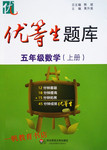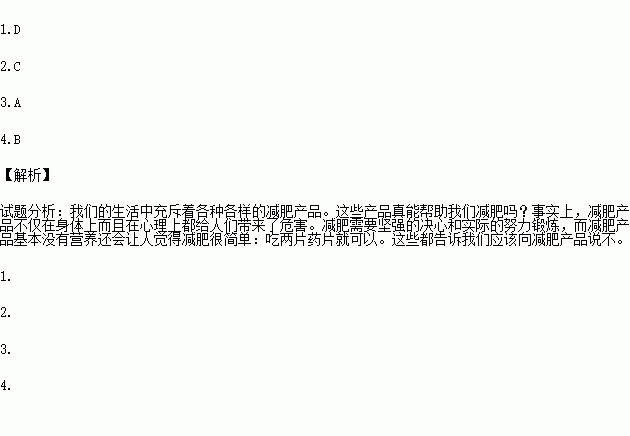题目内容
阅读理解
Diet Coke, diet Pepsi, diet pills, no-fat diet, vegetable diet… We are surrounded by the word “diet” everywhere we look and listen. We have so easily been attracted by the promise and potential of diet products that we have stopped thinking about what diet products are doing to us. We are paying for products that harm us psychologically and physically.
Diet products significantly weaken us psychologically. On one level, we are not allowing our brain to admit that our weight problems lie not in actually losing the weight, but in controlling the consumption(摄入) of fatty, high-calorie, unhealthy foods. Diet products allow us to jump over the thinking stage and go straight for the scale(秤)instead. All we have to do is to swallow or recognize the word “diet” in food labels(标签).
On another level, diet products have greater psychological effects. Every time we have a zero-calorie drink, we are telling ourselves without knowing that we don’t have to work to get results. Diet products make people believe that gain comes without pain, and that life can be without resistance(抵制and struggle.
The danger of diet products lies not only in the psychological effects they have on us, but also in the physical harm that they cause. Diet foods can indirectly harm our bodies because consuming them instead of healthy foods means we are preventing our bodies from having basic nutrients(营养成分). Diet foods and diet pills contain zero calorie only because the diet industry has created chemicals to produce these wonder products. Diet products may not be nutritional, and the chemical that go into diet products are potentially dangerous.
Now that we know the effects that diet products have on us, it is time to seriously think about buying them. Losing weight lies in the power of minds, not in the power of chemicals. Once we realize this, we will be much better able to resist diet products, and therefore prevent the psychological harm that comes from using them.
1.From Paragraph 1, we learn that ________.
A. diet products fail to bring out people’s potential
B. people are tired of diet products
C. people have difficulty in choosing diet products
D. diet products are misleading people
2.One psychological effect of diet products is that people are likely to _____.
A. hesitate before they enjoy diet foods
B. pay attention to their own eating habits
C. watch their weight rather than their diet
D. try out all kinds of diet foods
3.The purpose of writing this passage is _________.
A. to warn people of the side effect of diet products
B. to tell people how to lose weight
C. to advise people to eat diet products
D. to introduce some diet products
4.Which of the following shows the structure(结构)of the passage?

CP: Central Point P: Point Sp: Sub-point(次要点) C: Conclusion
 优等生题库系列答案
优等生题库系列答案
